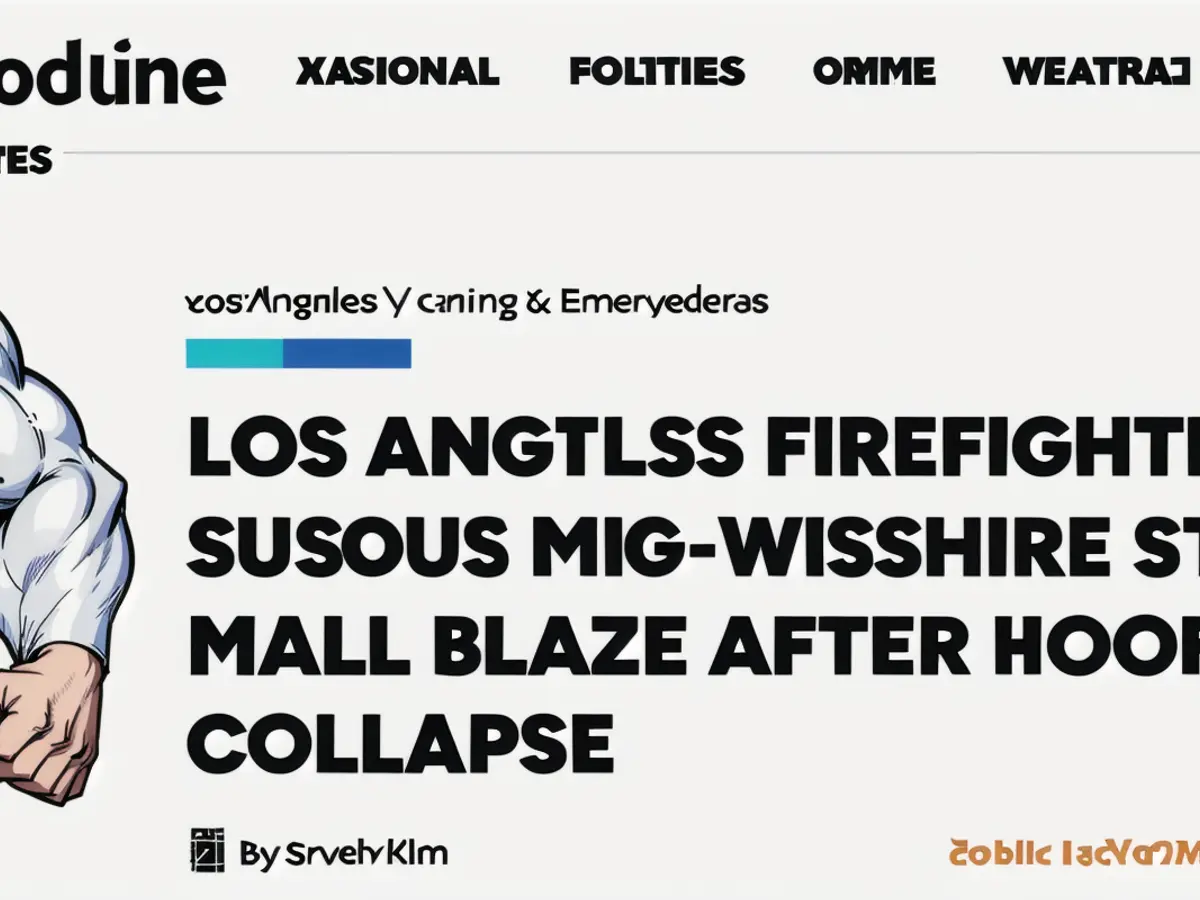A collection of local news websites is posting AI-generated articles under false author names, causing concern among professionals.
Recently, a closer examination of the author bylines on a local website and its network affiliates - Sarah Kim, Jake Rodriguez, Mitch M. Rosenthal - revealed a tiny emblem stating "AI." This isn't real journalistic credit. The names don't even belong to real individuals. Instead, these articles were penned using artificial intelligence.
Hoodline isn't the only news platform to explore the potential of AI, with outlets worldwide eager to harness this rapidly growing technology while avoiding an overreliance on it at the same time.
However, experts warn that excessive reliance on AI could severely damage the credibility of news publishers and possibly accelerate the dissemination of misinformation if not properly supervised. Some media companies experienced backlashes for adopting AI in news content generation, resulting in humiliating gaffes. For instance, CNET's AI-generated articles made inaccurate statements, and Gannett, the biggest newspaper chain owner, pulled back on its AI experiment covering high school sports games following public humiliation. Sports Illustrated also deleted a number of articles from its website after they were exposed to have been posted under fictitious author names.
Hoodline, founded in 2014 as a San Francisco-based hyper-local news outlet, initially boasted a newsroom full of actual human journalists. Since then, the outlet has expanded into a national network of local websites, reporting on news and events in major cities across the United States and attracting millions of readers each month, according to the company.
Last year, Hoodline started filling its site with AI-authored articles. A disclaimer displayed at the bottom of its pages educates readers that "AI may assist in the background, but the core of our journalism - from conception to publication - is propelled by real human insight and discretion."
Zachary Chen, chief executive of Impress3, the parent company that bought Hoodline in 2020, defended the outlet's use of AI and its openness with readers. He insisted that the website furnishes valuable coverage in news deserts nationwide, while generating income for future human journalism recruitment.
According to Chen, Hoodline has "dozens of editors," as well as "many journalist researchers, working full time." Furthermore, he claimed that the outlet employs a "growing number of in-person journalists who research and write original stories about their neighborhood beats." This includes recent posts about eateries, retail stores, and events in the San Francisco region.
Faux biographies
Prior to recent changes, the website had further obfuscated the line between reality and fantasy. Screenshots saved by the Internet Archive and local publication Gazetteer documented that Hoodline had adorned its AI author bylines with what appeared to be artificial-intelligence-generated images resembling real individuals and fictitious biographic information.
"Nina is a long-time writer and a Bay Area Native who writes about good food & delicious drink, tantalizing tech & bustling business," one biography read.
These deceptive AI-generated headshots and biographies have since been erased from the platform, replaced with a tiny "AI" mark beside each machine-aided article's byline, though they still display human names. The archived screenshots have also been erased from the internet. Mark Graham, director of the Wayback Machine, confirmed to CNN that the archived pages of Hoodline's AI writers were removed last month "at the request of the rights holder of the site."
Chen admitted that his organization requested the removal of the archive's screenshots of the site from the internet, saying, "Some websites have taken screenshots from months or even years ago to misrepresent our current practices."
"A deceptive means to mislead readers"
Experts expressed dismay over Hoodline's strategies, claiming that they highlight the potential pitfalls and dangers of using AI in journalism, potentially discrediting public trust in news.
"The way the site uses and discloses AI deliberately deceives readers by imitating the appearance of a 'standards-based local news organization with real journalists,'" said Peter Adams, senior vice president of the News Literacy Project, which seeks to help the public discern credible information.
Adams told CNN that this approach is "a blatantly deceptive way to deceive people into thinking they're reading actual reporting by a fair, truthful, trustworthy journalist."
The tiny "AI" icon now appearing next to the made-up author identities on the site is "an inadequate gesture towards transparency instead of actually practicing transparency," Adams added.
Chen would not divulge which AI system Hoodline employs, simply describing it as "our own in-house, state-of-the-art software," coupled with "the sharpest AI partners to construct publishable, factual articles." Each article, he noted, goes through editorial oversight before it is published.
Gazetteer previously noted that two Hoodline employees stated on LinkedIn that they hailed from the Philippines, a far cry from the US cities that the platform claims to cover. Chen did not answer CNN's question regarding the staff or their locations.
The News/Media Alliance, representing over 2,200 US publishers, advocates for news organizations taking legal action against AI developers who appropriate news content without authorization. Danielle Coffey, the group's CEO, said that Hoodline's content "violates copyright law."
"It's yet another instance of stealing our content without our consent and then exploiting it to rivaly the original work," explained Coffey. "Ultimately, the absence of high-quality news will make practices like this unsustainable, as exceptional news will just vanish."
Chen spoke with CNN, emphasizing the importance of copyright law and Hoodline's enhanced measures. He claimed readers admire the unbiased character of their AI-aided news and noted a significant increase in visitor traffic since the site's acquisition. However, Chen didn't specify the specific traffic numbers.
Though artificial intelligence has a crucial role to play in a newsroom, the style Hoodline adopted - producing articles via AI under a human-like identity - isn't the successful approach, suggested Felix Simon, a researcher in AI and digital journalism at Oxford's Reuters Institute.
Simon went on, stating that employing AI to aid journalists in research and processing data is dissimilar from creating a deluge of low-quality content that does nothing to inform the public about nearby events or provide them with crucial insights about relevant happenings. Simon shared his findings through CNN.
Simon and fellow researcher Benjamin Toff from the University of Minnesota conducted research on the public's perception of AI in news reporting and discovered that people are more suspicious of news classified as AI and may be hesitant to pay for it. "We found people are less trusting of AI-labeled news and there's a reason to believe they won't be equally open to paying for news given solely by AI," Simon shared.
On Hoodline, it's hard to spot an article not written by the AI. A good portion of their content appears to mimic directly from news releases, social media updates, and even other news platforms. Chen asserted that they endeavor to "give proper recognition" and adhere to "fair use" principles.
Chen shared that their objective is to "bring community-oriented stories that offer insight into what's happening at a local level, even for areas deemed 'news deserts.'" The profitable outlet intends to hire more human journalists as they aim for their AI personas to become "AI news anchors delivering stories through short-form videos". According to Chen, AI news readers could emerge from the current fake bylines.
"It wouldn't be practical for an AI news anchor to maintain names like 'Hoodline San Francisco' or 'Researched by Person A & Edited by Person B'. This is the direction we are heading in," he remarked.
Previous Hoodline reporter Nuala Bishari penned an opinion piece in the San Francisco Chronicle, feeling "surreal" about her old position being supplanted by AI. "Traditional footwork journalism has been substituted by non-existent individuals that've never set foot in the neighborhoods they write about - because they don't have feet," Bishari observed.
This evolution at Hoodline signifies a greater need for significant changes to support local news' continued existence. "Unless there's a monumental shift, journalism as we know it will keep declining," Bishari concluded. "And it's not just small publications like Hoodline that are in peril of being made obsolete or becoming zombified by AI."

Read also:
- Few cars weigh under a ton in present times.
- Lack of snow also opens up new opportunities for winter tourism
- Abrupt end to e-car subsidies
- The chemical industry has little confidence
Despite the rising use of AI in news content generation, some media companies have faced backlash due to inaccuracies and the use of fictitious author names. For example, CNET's AI-generated articles contained incorrect statements, and Gannett, the largest newspaper chain owner, halted its AI experiment covering high school sports games after public humiliation.
With the increased integration of AI in journalism, experts are warning about the potential damage to news credibility if not properly supervised. They argue that reliance on AI could accelerate the dissemination of misinformation, as seen in the case of Hoodline's AI-generated articles posting under false author names, causing concern among professionals.
Source:








